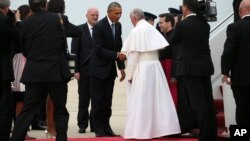It was an unprecedented welcome for an unprecedented visit.
When Pope Francis’ plane touched down Tuesday at Joint Base Andrews outside Washington, President Barack Obama, Vice President Joe Biden and their families were on hand to greet him.
“Our goal here has been to ensure that the way the pope is received here in the United States is consistent with the warm feelings of admiration and respect that the American people have for the pope, his teachings, his values and the way he has lived in life,” White House press secretary Josh Earnest said.
Amid cheers of “Welcome to the U.S.A.!” the pope disembarked from the plane, shaking hands with the first and second families, local archbishops and Catholic students as he began his historic trip to the United States.
It was not the first meeting between Obama and Francis — the president last met with the pontiff at the Vatican in March 2014 — but it was the first time the pontiff has set foot on American soil.
“He serves as a role model for so many based on the way that he has lived out the values in his life. He doesn’t just talk about them, but he lives them. And I think that has really struck a chord in many people, some of whom don’t even share the Catholic faith,” Earnest said.
Shared values
The National Security Council’s Charles Kupchan said White House officials traveled to the Vatican in June to shape the agenda of the pope’s U.S. trip.
“The president charged us from the very beginning with ensuring that this visit has lasting value and is as meaningful as possible,” Kupchan said. “And in that respect, the way we’ve gone about this is to try to think about how to elevate the objectives, the aspirations that the Obama administration and the Vatican share.”
On Wednesday, Obama will welcome Francis to the White House with an official arrival ceremony on the south lawn and an estimated 15,000 people in attendance. After the president and pope make brief remarks, they'll head into the Oval Office for one-on-one talks that administration officials say will be centered not on advancing a political agenda, but on committing to shared values.
“The way that both of these men have dedicated their lives to advancing values related to social justice and prioritizing those who are less fortunate and that they pursue those values with a sense of conviction, I think, gives them a lot of things to talk about,” Earnest told reporters.
In addition to combating social and economic inequality, White House officials said, the two leaders' other areas of common ground include addressing climate change — the focus of Francis’ encyclical that came just months before a U.N. climate conference in Paris in December.
“I think the pope has spoken about the need for all of us to meet our responsibility to care for God’s creation. And that I think provides an important moral backdrop to the type of policy decisions that individual leaders will make on climate change,” deputy national security adviser Ben Rhodes said in a recent press call.
Other topics
The pope has also spoken out against the persecution of religious minorities, particularly those in the Middle East, where Islamic State militants have targeted Christians and Yazidis in deadly attacks. This commitment to religious liberty and the rights of religious minorities is another shared value, White House officials said.
Other possible topics of discussion will be immigration, the Iran nuclear agreement and the normalization of ties between the United States and Cuba — the last subject being an area in which the pope’s leadership in promoting engagement was critical, administration officials said.
The pope arrived in the United States on Tuesday after a historic visit to Cuba, and the Vatican hosted U.S. and Cuban delegations last December as both sides finalized an agreement.
“Not only was the church an institution that was very important to large amounts of people in both Cuba and the United States, but Pope Francis was uniquely respected in both Cuba and the United States, which made both him and the Vatican exactly the right supporters for the process of normalization,” Rhodes said. “And that gave good impetus for our efforts.”
As for areas where Francis and Obama may not necessarily agree on, Earnest said the president would arrive at Wednesday’s talks with an open mind and a deep respect for the religious leader.
“His willingness to say what he believes and to live out those values have deeply inspired a lot of people, including many non-Catholics,” Earnest said of the pope.




